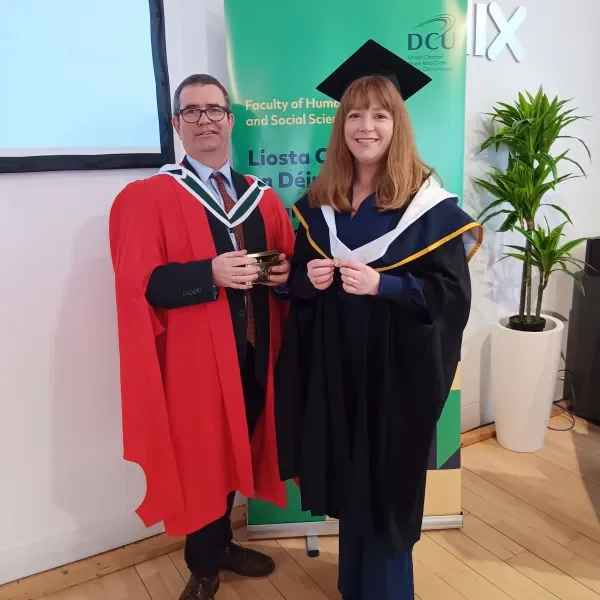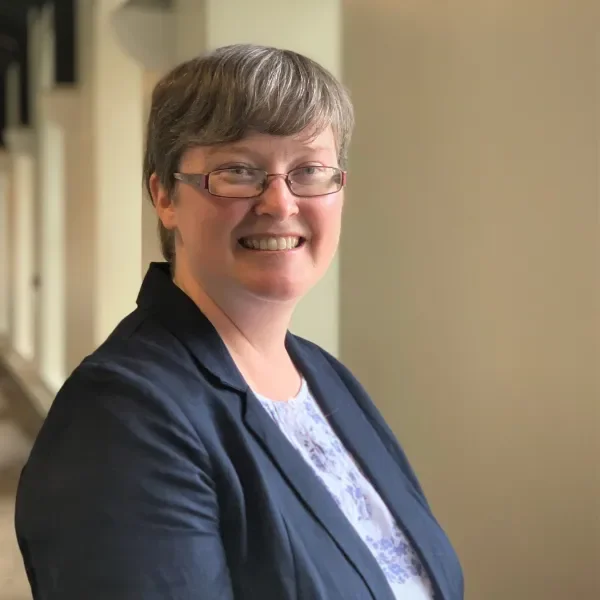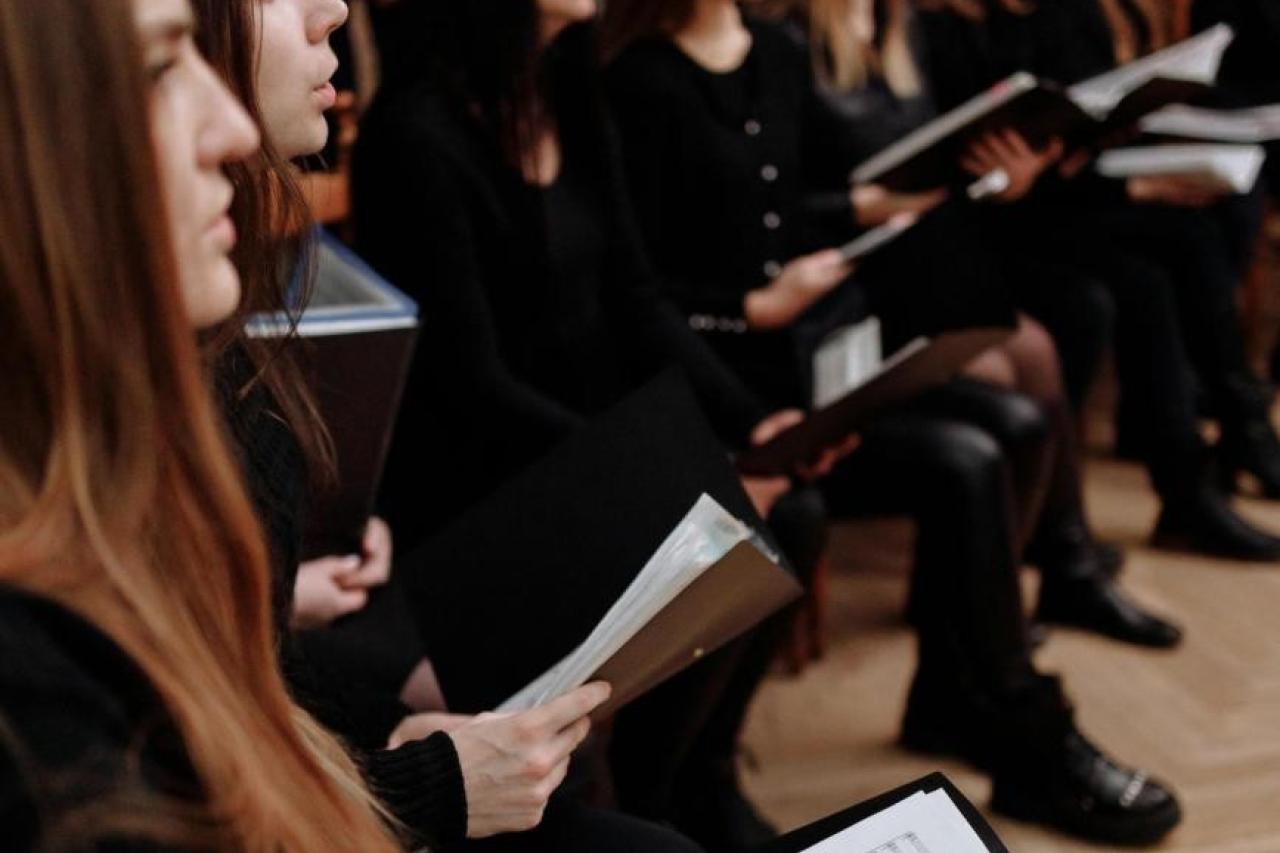Overview
DCU’s MA in Choral Studies is the first programme of its kind in Ireland. It offers an unrivalled opportunity to engage with the interpretation of choral repertoire from historical and contemporary contexts, and to create and perform new music under expert guidance.
In this programme, you will explore:
- Choral conducting and choir leadership
- Composing for choirs
- Historical approaches to choral music
- Cultural policy and the arts sector
Through this programme, students will acquire an advanced level of knowledge, understanding, and skills in the areas of historically informed choral interpretation, composition for choirs, leadership in choral performance and vocal technique, stylistic ensemble singing, editing, analytical score preparation and the arts sector in Ireland.
The programme will equip students with the academic, critical, musical and research expertise to underpin their activities in conducting, composing and ensemble singing, and will facilitate a deep understanding of the relationship between cultural policy, public bodies and enterprise in the arts.
Why DCU
DCU People

The MA in Choral Studies is a unique programme in Ireland.
Read more about Sinéad Crowley

My name Róisín Blunnie and I am the Programme Chair of the MA in Choral Studies here at DCU.
Read more about Róisín Blunnie
Careers & Further Options
Careers
The programme’s focus on combining leadership and creativity with strong interpersonal skills and keen attention to detail equips graduates to be effective and adaptable in today’s world.
Graduates may progress or enhance their careers in areas such as:
- Choral conducting
- Composition
- Ensemble singing
- Music teaching (subject to relevant qualifications)
- Choral arts administration
- Music criticism
- Broadcasting
- Recording and production
- Editing and choral publishing
Graduates may also pursue doctoral research in choral studies or related areas.
Entry Requirements
Recognised honours primary degree (Level 8) in Music, or in which Music is a subject, with a minimum of Second Class Honours.
OR
Recognised honours primary degree (Level 8) in another discipline, with supporting evidence of competence in Music, such as Grade 8/Diploma in instrumental/vocal studies, Grade 5 theory (ABRSM), and vocal/choral experience appropriate to commencing a Level 9 programme.
OR
Practitioners in the fields of conducting composition and choral practice who do not meet these prerequisites will be invited to submit a curriculum vitae and details of competence in music (as above) and may be asked to participate in an interview.
Recognition of Prior Learning (RPL) applicants are required to submit a cover letter along with their application under the Transcripts section of the portal, affirming their intent to apply for RPL. For more information on RPL see here.
In the case of international applicants, having educational qualifications of a standard equivalent to those outlined above.
International candidates who are non-native speakers of English must satisfy the University of their competency in the English language.
Due to the specialist nature of this programme, additional criteria may be used to assess suitability to undertake this programme. For further information, please contact the Programme Chair using the contact details above
Programme Structure
The programme is offered part-time over two years.
Lectures take place in Drumcondra on Monday evenings and on one Saturday per semester.
Students must successfully complete six core taught modules:
- Conducting, Interpretation and Style
- Choral Music: Historical and Analytical Approaches
- Composition for Voices
- Creative Approaches to Text
- Choral Contexts: National Infrastructure for the Arts
- Choral Leadership
In addition, students complete a research module, which includes a series of seminars on research methodologies and a minor thesis on choral studies or a portfolio of compositions/arrangements.
DCU is a vibrant hub of choral and compositional activity. DCU music staff include internationally recognised and award-winning experts in the field of choral studies.
The MA in Choral Studies is based in DCU’s School of Theology, Philosophy and Music, where students will find a dynamic, supportive, research-led learning environment with a strong commitment to social and cultural engagement and creative approaches to teaching that promote independent, scholarly critical thinking.
Why do this programme?
The MA in Choral Studies combines the study of choral conducting and composition within one programme.
Students will gain valuable experience in the use of conducting gesture as a representation of musical style and expression, and in the creation of new music for choral ensembles, informed by historical practice, scholarly literature and the latest developments in compositional techniques.
Students will acquire a deep understanding of stylistic and contextual influences on performance and composition and will receive regular feedback in choir leadership, ensemble singing, and creative work.
Fees and Funding
Fees
How To Apply
To apply for this programme:
All Applicants must apply through DCU's Student Application Portal which is available here. Here's a quick step by step guide if you need help with your application. Applicants are now open for Autumn 2025.
- Provide Academic Transcripts for each and every year of study with English translation if applicable.
- A personal statement detailing why you wish to study this programme
- If applicable, provide evidence of competence in the English language as per DCU entry requirements. Please see link https://www.dcu.ie/registry/english.shtml
Application Deadlines
Applications will be accepted on a rolling basis until the programme is full or until the following dates:
Closing date for non EU applicants is 1st July 2025
Closing date for EU applicants is 30th August 2025
Deferrals:
Please note deferrals are not permitted on this programme.
Application Queries
For EU applicant queries, please visit https://www.dcu.ie/registry/eu-postgraduate-taught-admissions or email postgraduateadmissions@dcu.ie
For non EU applicant queries, please visit https://www.dcu.ie/registry/international-admissions-undergraduate-and-postgraduate or email internationaladmissions@dcu.ie
Commencement of Programme
Please note, this programme commences next in September 2025.
Life On Campus
At DCU, our students can expect a unique campus experience. We are known for our excellent teaching and learning facilities, our active clubs and societies, and our great social and sporting facilities. All this makes DCU an exciting place to be.
DCU has three academic campuses; Glasnevin, St. Patrick’s and All Hallows (both in Drumcondra), all close to Dublin City centre.
They can be reached by public transport, Dublin Bus and Bus Éireann, with our Drumcondra campuses a ten minute walk from Drumcondra Train Station. Glasnevin is a 20 minute walk from St Patrick’s and All Hallows. They are also linked by Dublin Bus.
Each campus has a library (O’Reilly, Cregan and Woodlock Hall), study spaces, restaurants, and on-campus residencies. There are sports facilities on Glasnevin and St. Patrick’s, and there is a dedicated sports campus, St Claire’s, located near Glasnevin on the Ballymun Road.
DCU’s 19,000 students have access to exceptional teaching and learning facilities across our three academic campuses.
These include modern learning theatres, research centres, a new media and TV studio, radio/podcast studios, computer suites and advanced labs in the areas of Languages, Engineering, Physics, Chemistry and Biotechnology, as well as a Sports Performance centre and a training hospital ward. In 2021, we opened our first virtual reality ‘Leadership Lab’, which is located in our Business School.
We continue to improve and update our facilities. For example, construction of a new world-class STEM facility is underway on the Glasnevin campus. With capacity for an extra 3,000 STEM students, this facility will advance DCU’s international reputation for excellence in science and health, computing and engineering disciplines.
Studying in DCU isn’t just about course work. The university is rich in student life and activities.
There are more than 140 clubs and societies for students in DCU, with ‘Clubs & Socs’ days taking place on both the Glasnevin and Drumcondra campuses at the start of the academic year. They span everything from rugby to rock climbing, anime to jazz.
For many students, sport is an important part of the DCU experience. DCU’s Sports Complex boasts a 25 metre swimming pool, fitness centre gym, all-weather pitches and squash courts, as well as soccer, GAA and rugby pitches. DCU Dóchas Éireann, the university’s GAA club, is the largest third level Gaelic Games club in the country. Meanwhile, DCU Athletics has been Ireland’s highest achieving university club for many years. And DCU has dozens of other clubs to get involved in, from Archery to Weightlifting.
The Glasnevin campus is home to our purpose built, state-of-the-art student centre, The U, which serves the needs of a rapidly growing student body. Here, you will find the Student Leadership and Lifeskills Centre, performing arts and cultural spaces for students and the wider community, and the Entrepreneurship and Innovation Hub. Also located on our Glasnevin campus is The Helix, our renowned performing arts centre.
On our St Patrick’s campus, we have the Java Student Hub, a vibrant, warm and welcoming space where students can meet for coffee, play music, use the projector to watch events, or just relax. The walls of the Java Hub were designed based on the cultural history of St Patrick’s Campus, including the special references to the notable sporting history and history of the arts.
We have a number of academic, professional and social supports for students.
Student Advice & Learning Skills Centre - Offers a wide range of supports and services to students and advice
The Writing Centre - drop-in writing workshops for students through the academic year
Maths Learning Centre - provides maths support for students of all ability levels with maths modules
Student Learning - facilitate the transition from passive to active learning for students at DCU, by teaching study skills, nurturing critical thinking and building student confidence.
Careers work with students to help them on their professional journey into graduate employment.
Our student support team offers a comprehensive support programme, helping students make that all important transition into university life and focusing on building confidence and skills which are key to success at third level.

DCU Glasnevin Campus
FAQs
Is DCU all one campus?
DCU is a multi campus university - the Glasnevin, St Patrick's and All Hallows campuses. The St Patrick's campus is where the Education courses are taught and some of the subjects from the BA Joint Honours degree. There is a 20-25 minute walk between the campuses but there are buses and bikes available to go between them also.
Click here to see maps of all of our campuses
If I'm studying on the St Patrick's campus, can I use the library and sports centre on the Glasnevin campus?
Yes, all facilities such as sports and accommodation are open for all DCU students to avail of.
Are there libraries in DCU and if they have wifi and work stations?
We have a brand new state of the art four floor library on our St. Patrick's Campus which complements the existing library on the Glasnevin campus. There is free wifi, work stations as well as desktop computers.
Does DCU provide accommodation?
DCU does have on-campus accommodation for undergraduate and postgraduate students, and you can find out more and apply via the Accommodation Office webpage.






